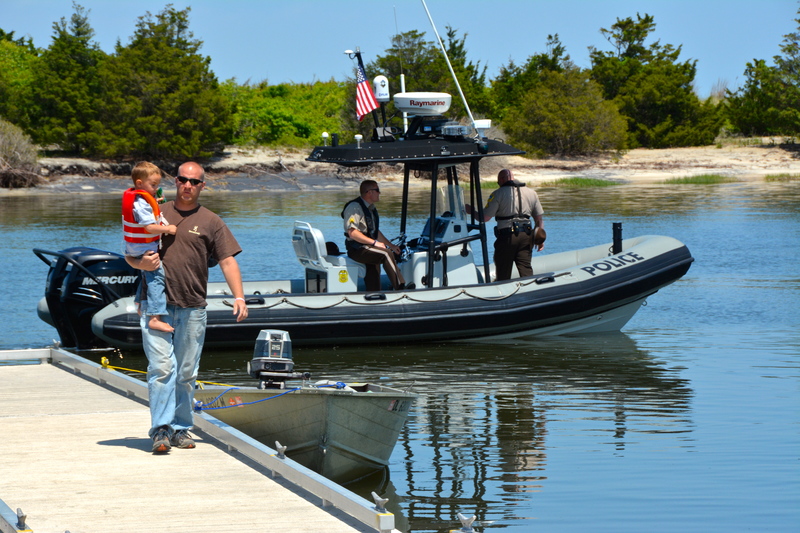Officials stress importance of wearing life jackets
While out on the water this summer, wearing a life jacket is as important as wearing a seat belt in a car.
Statistics support the importance of wearing life jackets. Nationally, approximately 500 people drown each year from recreational boating accidents. According to U.S. Coast Guard data from 2012, nearly three-quarters of all boating fatalities nationwide were drowning victims – and more than 80 percent of them were not wearing life jackets.
On May 19, a host of state, federal, Department of Natural Resources and Environmental Control, Coast Guard and Coast Guard Auxiliary officials joined at the Lewes boat ramp to officially kick off National Boating Safety Week.
While stressing the importance of boating education, Chief Robert Legates of the Division of Fish and Wildlife Enforcement Section also encouraged boaters to be aware and alert on the water. “Last year, we had no boating-related fatalities and eight reportable boating accidents. We’d like to see the number of accidents go down even more,” Legates said.
Coast Guard statistics show the top five primary contributing factors for boating accidents are operator inattention, improper lookout, operator inexperience, excessive speed and mechanical failure. Alcohol use is the leading contributing factor in fatal boating accidents and was listed as the leading factor in 17 percent of the 651 boating-related fatalities reported nationwide in 2012.
Delaware law requires that children age 12 and younger wear a life jacket while underway in any vessel on Delaware waters. “Though life jackets are not legally required for adults, they should also wear them, especially anyone with limited swimming skills, said Senior Cpl. Carl Winckoski, Fish and Wildlife Enforcement.
While it is not illegal for recreational boat operators to consume alcohol, the same blood alcohol limit used to measure intoxication in automobile drivers applies to boat operators: 0.08 or above is legally intoxicated.
Taking a boating safety course can improve skills and reduce the chances of an accident. Coast Guard statistics show that in states where instructional data was available, 85 percent of reported fatalities occurred on boats where the operator had not received boating safety instruction.
Under Delaware law, all persons born on or after Jan. 1, 1978, must successfully complete a boating safety course in order to operate a boat in Delaware waters, including personal watercraft.
Delaware’s Office of Boating Safety and Education provides volunteer instructors to private and nonprofit organizations, schools, clubs and the public to educate boaters on skills and seamanship.
Delaware’s 8-hour basic boating safety course, which fulfills Delaware’s mandatory boating safety class requirement, is offered in multiple locations statewide in one to four sessions. An online version of the course also is offered. Upon completing the course, boaters receive a boating safety certificate, which they should carry with them while boating as proof of course completion. In-classroom costs range from $10 to $30.
For more information, including the boating safety class schedule, access to the online Delaware boating handbook and other boating information call 302-739-9913 or email carl.winckoski@state.de.us.
Among those taking part in the event included U.S. Sen. Tom Carper; Rep. Harvey Kenton; Rep. Stephen Smyk; DNREC Secretary Collin O’Mara; Division of Fish and Wildlife Director David Saveikis; Lt. Comm. Randy Preston of the U.S. Coast Guard’s Lewes Marine Safety Detachment; USCG Auxiliary Vice Commander Tom Mann; Warren Huff of the Lewes USCG Auxiliary; USCG officers and auxiliary volunteer boating safety instructors; members of the U.S. Coast Guard; DNREC enforcement officers; and volunteer boating safety instructors with the U.S. Power Squadron’s Nanticoke Sail & Power Squadron of Seaford.































































